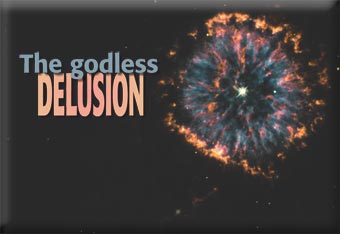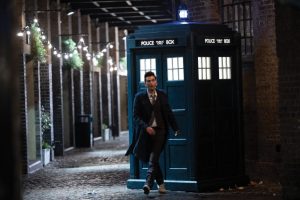Don’t listen to those New Atheists, says this Vatican astronomer. You shouldn’t have to choose between science and faith.
Last fall, I confess, I was in the habit of looking into every bookstore I came across for the bright yellow cover of my latest book, God’s Mechanics: How Scientists and Engineers Make Sense of Religion (Jossey-Bass). In every store I would find a large stack of books with a familiar yellow dust jacket sitting in the religion section. Unfortunately those yellow books were not mine but copies of Christopher Hitchens’ anti-religion screed, God Is Not Great (Twelve Books). Yellow was a popular color in the publishing business last fall, I guess.
Along with the color yellow, books bashing religion in the name of science have become quite fashionable of late. These include, among others, recent works from the biologist Richard Dawkins, the cognitive scientist/philosopher Daniel Dennett, and the neuroscientist Sam Harris. Collectively these authors have been dubbed the “New Atheists.”
Others better equipped than I have pointed out the shortcomings of the New Atheists. Typical is Jim Holt’s quietly devastating review of Dawkins’ book The God Delusion in The New York Times Sunday Book Review (Oct. 22, 2006). Though himself sympathetic to much in Dawkins’ stance, Holt notes, “Dawkins’ failure to appreciate just how hard philosophical questions about religion can be makes reading [his book] an intellectually frustrating experience.” Meanwhile, Stephen Prothero concludes his review in The Washington Post (May 6, 2007) of Hitchens’ book by sighing, “I have never encountered a book whose author is so fundamentally unacquainted with its subject.” It appears that these “evangelical atheists” know as little about religion as the religious fundamentalists know about science.
Indeed, none of the New Atheist books carry the panache of John William Draper’s History of the Conflict Between Religion and Science (1874) or Andrew Dixon White’s A History of the Warfare of Science With Theology in Christendom (1896). Those Victorian-era bestsellers, enamored with the inevitable triumph of progress over superstition, provided colorful (if completely invented) snapshots of history, such as Columbus heroically battling a church full of flat-earthers to prove that the world was round. By contrast, our New Atheists are reduced to a more mundane recitation of the evils done by various people in the name of religion, and the curious logic that, assuming science and religion are in conflict, the fact that science is true must imply that religion is not.
Besides its dust jacket color, Hitchens’ work has another thing in common with my own effort: Neither book is likely to change the mind of anyone who’s already camped out on the other side. I don’t much fear that the New Atheists pose a serious challenge to a believer’s faith in religion. Most believers simply won’t bother reading them.
What I do fear, though, is the disastrous effect that this “scientific” atheism has on a believer’s appreciation of science. The typical churchgoer may not know much about science, but they do know their church. If they are told they must choose between science and religion, they’ll choose religion every time, even if it means rejecting science. Rather than undermining religion, the New Atheists are reinforcing antiscience prejudices in the general public. They’re undermining science.
But the atheistic scientists portrayed in these books are about as representative as the stereotyped fundamentalist preachers they cite. People like them do exist, but they are hardly the norm.
Indeed, when I was researching the religious behavior of scientists and engineers (the “mechanics” in the title of my book), I found that the world of science is not nearly as alienated from religion as the New Atheists would have you believe. My very role at the Vatican as one of the papal astronomers should suggest that the Catholic Church is no enemy to science per se.
But perhaps most importantly, the image of science and religion as two camps at war is a gross oversimplification of the issues at stake, and of those of us who deal with those issues in our own personal lives. The barriers between science and religion, belief and doubt, faith and reason are not nearly as black and white as the pundits would have you believe.
I was an active scientist for 15 years before I took vows as a Jesuit brother. When I returned to science as a Jesuit, I was apprehensive of the reaction I would get from my fellow scientists. What actually happened was what I least expected: Time after time, colleagues whom I had known for years would come up to me and say, “You’re a Jesuit? Wonderful! Let me tell you about the church I belong to.”
We had all thought we were the only believers in the bunch. But once I had declared myself publicly as a churchgoer-scientist, the rest of my friends felt comfortable talking about their own religious lives. I came to realize that the proportion of scientists and engineers who were churchgoers pretty much mirrors the society in which we live. In Britain, where churchgoing is rare, perhaps 10 percent of the scientists of my acquaintance are religious; in Chicago maybe half the scientists I know belong to a church.
In the two months I spent interviewing scientists and engineers in Silicon Valley for God’s Mechanics, I encountered representatives of nearly every religion you could imagine. Mind you, their take on religion was often colored by their peculiar “techie” slant on the world. The questions they asked, and the sorts of answers they were looking for, were often far more pragmatic and functional than philosophical or overtly spiritual. And yet, in their own way, they experienced a deep connection to God, especially God as Creator, whose creation they encountered so intimately in the lab.
Many famous scientists throughout history have been churchgoers. James Clerk Maxwell, whose equations described the nature of radio waves and light, was a devoted Anglican; astronomers Angelo Secchi, who first classified stars by their spectra, and Georges Lemaître, who came up with the Big Bang theory, were both Catholic priests. Bernard Lovell, the man who built the radio telescope at Jodrell Bank in England, is a Methodist; Apollo 11 astronaut Buzz Aldrin brought with him to the moon the Communion bread and wine from his Presbyterian church. (Catholic astronauts on the Space Shuttle, such as the current director of NASA’s Stennis Space Center, Robert Cabana, have also brought Communion with them into space.)
And of course the very foundations of science rest on the work of medieval clerics like Albert the Great, Roger Bacon, and Nicholas Oresme. Copernicus, Galileo, Kepler, and Newton all thought of themselves as deeply religious. A significant number of scientists publishing in 18th-century journals identified themselves as “Reverend”; back then, clergymen were among the few people who had the education and the free time to do all the collecting and sorting of data that is the backbone of scientific research. (We still call it “clerical” work.)
This isn’t offered up as a proof that religion must be right because it’s been endorsed by famous scientists. It’s just a simple refutation of the canard that you have to be an atheist to be a scientist.
Even the atheists whom I met during my interviews were sympathetic to my religious calling. They were surprised, of course, that I could be employed by the Vatican to do research into the origins of the solar system. Given how the media distorts science and religion, they had assumed that all Christians must be creationists. But does the following statement sound like it comes from someone who insists on a creationist’s interpretation of Genesis?
“Ten billion years ago, the matter of all the spiral nebulae was compressed into a relatively narrow space, at the time of the beginning of the cosmic processes . . . the average age of the most ancient minerals [on Earth] is indicated at a maximum of 5 billion years. . . . Although these figures are astonishing, nevertheless, even the simplest believer would not take them as unheard of and differing from those derived from the first words of Genesis, ‘In the beginning.’ ”
Modern as it sounds, this quotation is, in fact, more than 50 years old. The speaker was Pope Pius XII, addressing the Pontifical Academy of Sciences in 1951.
Unfortunately, the more the New Atheists rail against religion for being literalist, the more they convince devout believers that one must be a literalist and reject science in order to be faithful to their church. But this kind of literalism has never been Catholic doctrine.
Even in A.D. 400, writing On the Literal Interpretation of Genesis, St. Augustine acknowledged that a non-Christian knows from reason and experience “something about the Earth, the heavens, and the other elements of this world, about the motion and orbit of the stars.” Furthermore, he warns his readers, “it is a disgraceful and dangerous thing for an infidel to hear a Christian, presumably giving the meaning of holy scripture, talking nonsense on these topics; and we should take all means to prevent such an embarrassing situation, in which people show up vast ignorance in a Christian and laugh it to scorn.”
Yet to my mind, even worse than the New Atheists’ mischaracterization of religion and science is their deeper distortion of what is means to be a scientist and a believer. By labeling individuals as either “scientists” or “believers,” our lives and personal journeys are flattened into two-dimensional cardboard cutouts.
By painting science and faith as implacable enemies, both are caricatured as systems of Pure Truth in which no sense of doubt can be entertained.
But that’s not how we do science, that’s not how we pray, and that’s not how we live our lives. Children may learn science as nothing but a big book of facts (and religion an equally big book of rules), but those who practice know that both science and religion are an often exhilarating whirlwind of arguments and countercurrents as we struggle to fit a structure that we think we have confidence in, around what we experience every day in our labs and in our lives. As Anne Lamott famously put it, the opposite of faith is not doubt; it is certainty.
The route that a typical techie takes toward faith often involves a period during their adolescent years of skeptical questioning, followed by a return to church once they marry and start a family. But even at their most skeptical, young techies are still searching for God. And even after they’ve joined a parish, they still have a lot of skepticism about what they hear coming from the pulpit.
The New Atheists themselves are living in this tension. Hitchens’ clever title God Is Not Great is a play on the mantra “God is great.” But the heart of Hitchens’ complaint is not that God does not exist, much less that God is actually evil, but rather that too often religion has promoted a version of God that is not great—which is to say, a false God. The logic of Hitchens’ complaint demands that a real greatness must exist, somewhere, even if he thinks religion hasn’t found it.
That religion has often failed is not surprising; it is a human activity and subject to human failures. Indeed, it is precisely because religion has such a great power to do good that its perversion has such a potential for evil. Science, which has its own potential for evil, has its failures, too—like the once-fashionable eugenics movement, opposed by “reactionary” religion, which reached its logical conclusion in the Nazi death camps.
Throughout history half of the theories proposed by scientists have turned out to be wrong (including those theories about “the motion and orbits of the stars” that Augustine cited). Our task is to figure out which theories are right, and which religious visions truly are from God. Discernment is at the heart of both enterprises.
And just because the practitioners of religion or science are flawed human beings doesn’t invalidate their real achievements. Einstein had two failed marriages, and his equation E = mc2 led to the horror of nuclear war. Neither fact alters the truth of his science.
We study the universe through science precisely because we don’t know how it all works. We practice religion precisely because we know we need the practice.
But we have confidence in our efforts precisely because we believe in a God who indeed is great, even if our understanding of God is not. We can know God because God wants to be known.
And we believe the scientific enterprise is both possible and worth pursuing because we believe in a Creator who has built the universe on order and reason; because we have a Creator who has given us humans the capacity to grasp (at least in part) the laws and statutes that can describe its order; and most of all, because we experience a Creator who has given us a desire to be with him by searching for those laws. Success in our research, as in our religion, is rewarded with a joy that is a foretaste of what we will experience when we see God face to face.
“The godless delusion” appeared in the November 2008 issue of U.S. Catholic (pgs. 28-31); Volume 73, Number 11.














Add comment